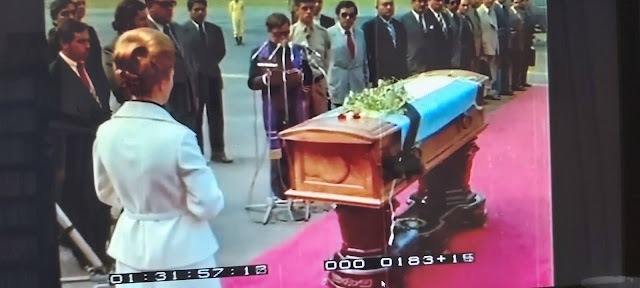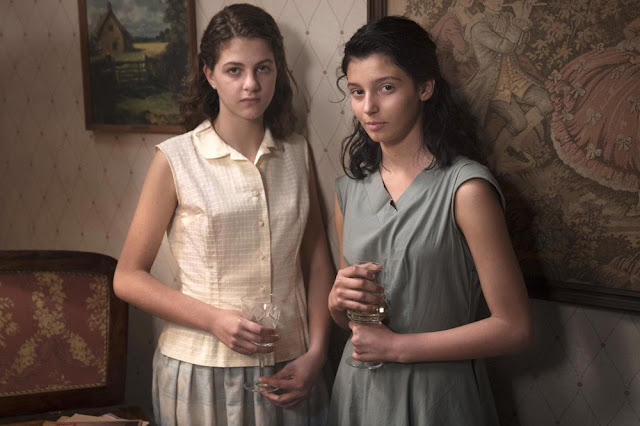Una casa sin cortinas: El enigma de Isabel Perón
(Español / English)
Premio Flow en el #BAFICI2021
Buscando a Isabel /
Notable y apasionante documental de investigación sobre la incómoda figura de la ex presidenta argentina derrocada por el golpe cívico-militar de 1976 y viuda de Perón María Estela Martínez (Isabel Perón), con abundante material de archivo (en parte inédito) y entrevistas a una multitud de figaras políticas y sindicales de primer orden y a otras más anónimas de su círculo cercano, delineando un retrato personal y político. Su intención de dar con su paradero actual y acceder a un reportaje con ella va bañando al relato con un apasionante y creciente aire de thriller.
Remarkable and exciting investigative documentary on the uncomfortable figure of the former Argentine president overthrown by the 1976 civic-military coup and widow of Perón María Estela Martínez (Isabel Perón), with abundant archive material (partly unpublished) and interviews with a multitude of leading political and trade union figures and others more anonymous from their close circle, outlining a personal and political portrait. Her intention to find her current whereabouts and access a report with her bathes the story with an exciting and growing air of thriller.
Isabel Perón es un personaje poco abordado, una papa caliente que genera incomodidad (y hasta vergüenza) en el peronismo y, como dice el título de la película, y por esa razón, bastante enigmático. Y adornado con los mitos que nunca se priva de adosar el siempre activo y virulento antiperonismo argentino.
Si bien el documental de Julián Troksberg tiene una estructura clásica integrada por material de archivo (en parte inédito hasta ahora) y reportajes fragmentados y alternados a una multitud de personajes vinculados a ella y al peronismo, se añade el plus del documental de investigación que procura finalmente encontrar y entrevistar al personaje que retrata (como lo hace el falso documental La estrella roja o la notable Yo no sé qué me habrán hecho tus ojos) y que va bañando al relato con un apasionante y creciente aire de thriller.
En cuanto a lo biográfico, entre otros aspectos, se relata cómo conoció a Perón, qué funciones cumplió mientras Perón estuvo exiliado y en su retorno, durante su estancia en el poder y su suerte luego del golpe del 76, los lugares que habitó. Y son los testimonios los que van dibujando el perfil de su personalidad.
Los entrevistados son en algunos casos personalidades de primer orden y en otros quienes estuvieron o están muy cerca de ella en calidad de personal de servicio, confidentes, anfitriones, abogados, apoderados, asesores, médicos o vecinos.
Entre las personalidades desfilan dirigentes políticos,
sindicalistas, periodistas, artistas plásticos que la retrataron y ministros de
su gabinete (entre estos últimos, son imperdibles los fragmentos correspondientes
a Carlos Ruckauf, uno de los firmantes del fatídico decreto que autorizó a “aniquilar
el accionar subversivo”). Por mencionar sólo algunas de las personalidades: Carlos
Corach, Haydeé Padilla, Nilda Garré, Esteban Peicovich, Juan Carlos Dante Gullo,
Juan Manuel Abal Medina, Marcia Schvartz, Hugo Curto, Juan Gabriel Labaké, Eva Gatica,
Osvaldo Papaleo y siguen las firmas.
This remarkable documentary investigates the private and public life of María Estela Martínez (known as Isabel or Isabelita), who was the wife of Juan Domingo Perón, his vice president in his third presidency and who, when she became a widow in 1974, became the first woman president of Argentina until she was overthrown by a civil-military coup on March 24, 1976. She presided over one of the most turbulent periods in Argentine history, characterized by the armed struggle of leftist organizations, Army operations against them. organizations, attacks and the violent actions of triple A, an extreme right-wing parapolice organization led by the minister of his government López Rega, formerly Perón's private secretary.
Isabel Perón is a character little approached, a hot potato that generates discomfort (and even shame) in Peronism and, as the title of the film says, and for that reason, quite enigmatic. And adorned with the myths that she never deprives herself of attaching the always active and virulent Argentine anti-Peronism.
Although Julián Troksberg's documentary has a classic structure made up of archive material (partly unpublished until now) and fragmented and alternating reports to a multitude of characters linked to her and Peronism, the plus of the investigative documentary that seeks is added finally finding and interviewing the character he portrays (as does the mockumentary The Red Star or the Remarkable I don't know what your eyes have done to me) and who bathes the story with an exciting and growing air of a thriller.
As for the biographical, among other aspects, it is related how he met Perón, what functions he fulfilled while Perón was in exile and on his return, during his stay in power and his fate after the coup of 76, the places he inhabited . And it is the testimonies that are drawing the profile of her personality.
The interviewees are in some cases personalities of the first order and in others who were or are very close to her as service personnel, confidants, hosts, lawyers, attorneys, advisers, doctors or neighbors.
Among the personalities parade political leaders, trade
unionists, journalists, visual artists who portrayed her and her cabinet
ministers (among the latter, the fragments corresponding to Carlos Ruckauf, one
of the signatories of the fateful decree that authorized to “annihilate the
subversive actions are unmissable ”). To mention just a few of the personalities:
Carlos Corach, Haydeé Padilla, Nilda Garré, Esteban Peicovich, Juan Carlos
Dante Gullo, Juan Manuel Abal Medina, Marcia Schvartz, Hugo Curto, Juan Gabriel
Labaké, Eva Gatica, Osvaldo Papaleo and the signatures follow.





Comentarios
Publicar un comentario
Mensajes sujetos a moderación